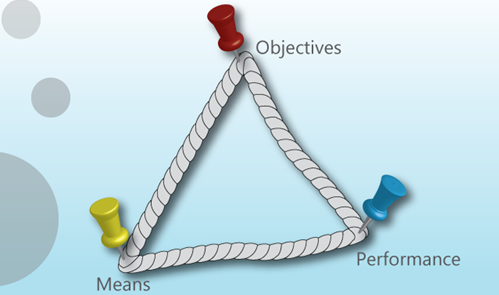Don’t Limit Yourself with Time, Cost and Quality

Most people with experience of projects are familiar with the Time-Cost-Quality (T-C-Q) triangle. The idea is that project success is where there is an appropriate balance between meeting the planned schedule, the expenditure, and the specification.
The triangle really helps senior managers understand that tolerances should be set for one, two or all three sides. For example, when issues arise discretion on expenditure might be needed to meet the deadline.
No tolerances means no management. The project manager would have no flexibility or discretion, making him or her just an administrator. Management is judicious decision-making between compromises. If there’s no tolerances then there is no room for compromises.
The problem with the T-C-Q triangle is that it’s not very useful in the day-to-day managing of the project. Any experienced project manager knows that there are many other factors to consider and to achieve some compromised balance between.
Time-Cost-Quality is a more useful concept within a work-package but begins to break down even at the project board level, and becomes meaningless at programme and portfolio levels.
So perhaps we should be looking to another triangle, one that helps the business appreciate what is involved in managing real projects.
Pm today straight to your inbox
subscribe
I have found an Objectives-Means-Performance (O-M-P) triangle to be of significant benefit at the portfolio level. Similar to the T-C-Q triangle you cannot fix all three sides; at least one has to have sufficient tolerance.
It is right and proper for senior managers to be concerned about and to specify what they want their portfolio of programmes and projects to achieve. It is also appropriate for them to set the performance levels they expect.
But the O-M-P triangle is useful in helping senior managers understand that they need to lighten their control of the means of achieving the objectives. They need to give discretion to each programme and project.
They may express preferences, but shouldn’t mandate the means.
This is particularly relevant to how politicians specify business requirements for major programmes. They frequently obsess about the means and neglect one or both of objectives and performance.
For example, in the UK, the millennium dome was publically ridiculed as a programme because the politicians could not say what it was for. They were only concerned about the means – the building.
They just hoped that someone else would come up with its purpose. Similarly, UK politicians have from time to time stated their intention to introduce a national identify card for all citizens.
Again, they find talking about the means, the card, easier than talking about what it is really for and how they would measure whether it had been a success.
Whenever I review programmes and projects that got into trouble, I often find that the problem was not at the project and programme level, but at the portfolio level where the Objective-Means-Performance balance was needlessly rigid.
Visit www.onemind.co.uk for more information.




